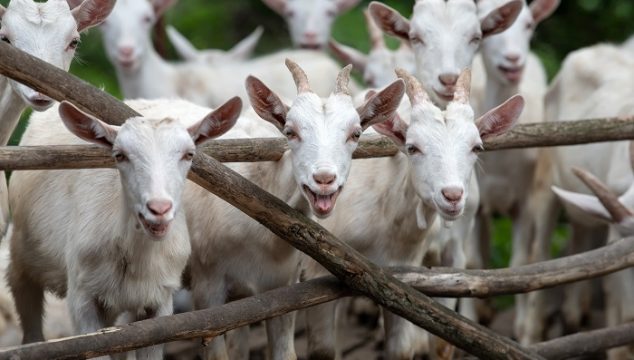

Enrichment is often thought of as an “extra” or optional provision for goats. Farm managers are understandably focused on providing the food, water, and housing that is necessary for residents to live. However, we are hoping that by incorporating enrichment as an aspect of general care, the lives of goats will be enriched. This is of particular importance for residents residing in smaller, more confined, or barren living spaces. In areas that experience intense cold, the best way to keep goat residents warm is to leave them in a smaller indoor living space when they may normally have a larger outdoor space for foraging and other goat behaviors. In cases like these, enrichment can make a world of difference in the lives of residents. No one likes to be bored, including animals, regardless of species.
It is important to understand the species-specific needs of your animals, in addition to considering their individual needs. An example of a species-specific understanding acknowledges that goats are curious browsers with an aptitude for climbing, and that needs to be taken into consideration when developing an enrichment plan.
When developing an enrichment plan for residents, it’s important to consider the types of behavior in which you are hoping to see an increase or decrease. For example, if you are hoping to reduce confrontational behaviors, there are particular enrichment options that are ideal for that, such as creating a more dynamic space with furniture of various heights, and including dividers between feeding areas. Do you want to increase exploratory behavior? Novel objects and nutritional browsing enrichment may be better suited in this case. We know you have your hands full managing a sanctuary; developing an enrichment plan for species, particular groupings, and individuals can actually help you save time and money in the future
social enrichment:
This may seem obvious, but it’s important to mention. Goats are social animals and it’s important for them to have access to other goats. Of course, there are times when this isn’t possible, due to medical issues, herd disagreements, or sadly, the death of their herd-mates. In cases like these where direct contact with others of their species isn’t possible, there are ways that you can enrich their lives during this transitory time.
– If at all possible, goats should be housed with other goats. If you have sheep, goats can potentially live comfortably with them, though they must be monitored regularly to ensure the goat does not exhibit confrontational behaviors towards any sheep or residents of any species (and ensure sheep can’t eat minerals formulated specifically for goats). If a goat has nobody else to live safely with, extra steps should be taken to alleviate the stress caused by their isolation.
– Provide visual contact with other goats.
– You should also provide visual barriers, so goats can separate themselves from other goats who are more confrontational.
– Add a mirror to their living space. With goats, it’s important that they are unable to actually touch the mirror, in case they decide to headbutt it and it breaks, causing a potentially hazardous situation. You could use highly polished metal instead of glass, or place the mirror out of reach.
– Add a small amount of soiled bedding into their living space from their original herd’s living space.
– Play a recording of normal or “happy” goat sounds.
 Contact Jaguza Support
Contact Jaguza Support